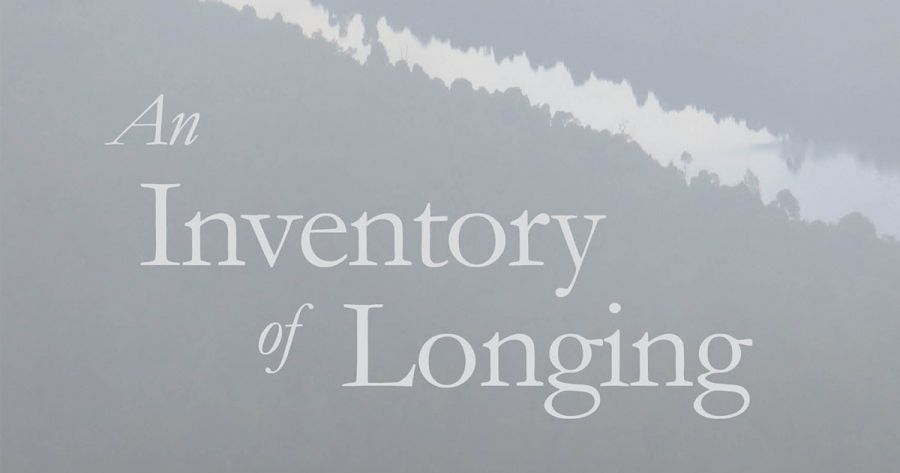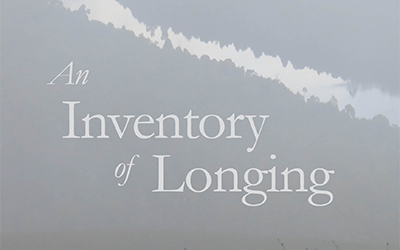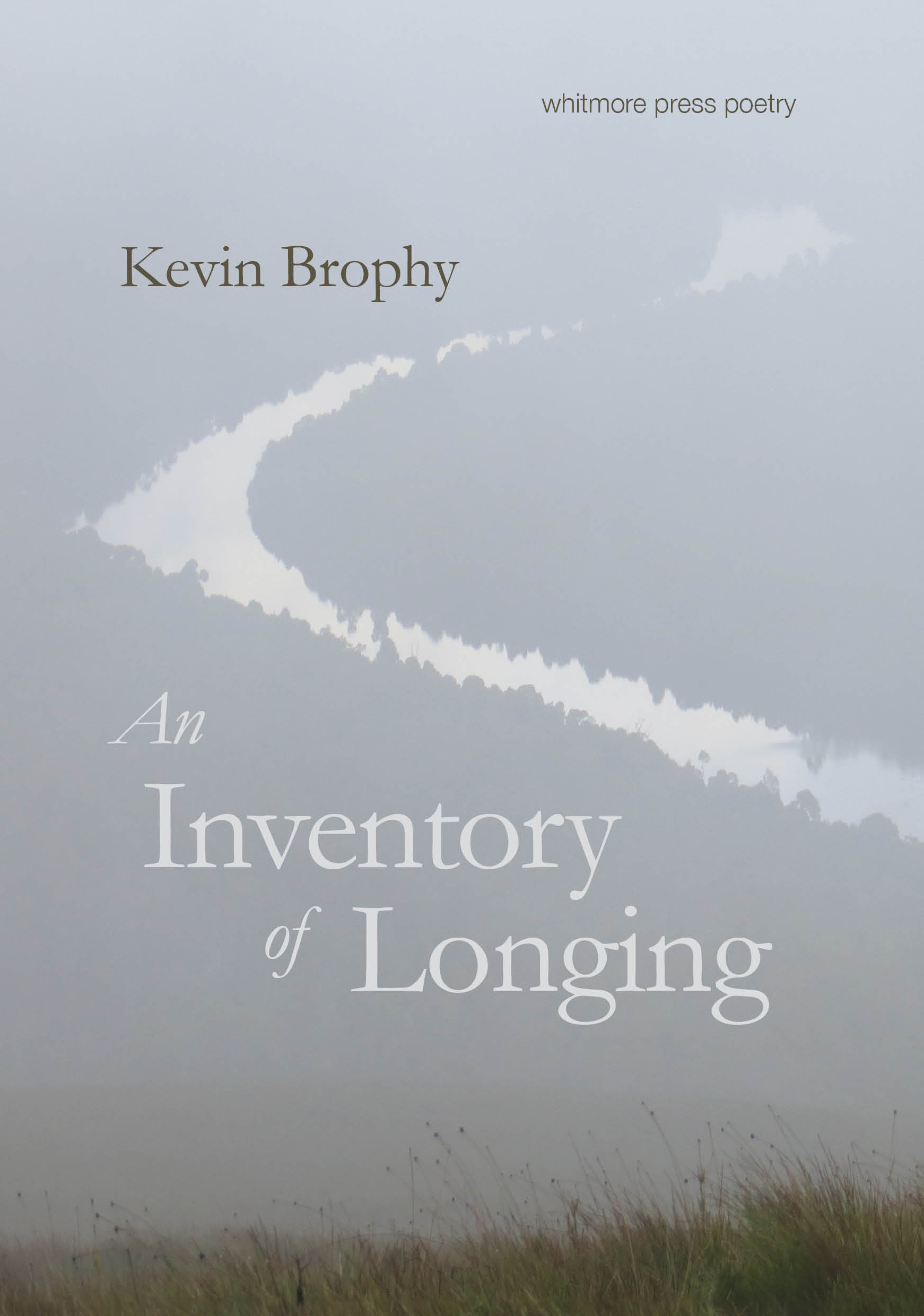
- Free Article: No
- Contents Category: Poetry
- Review Article: Yes
- Article Title: Guests in this world
- Article Subtitle: Poetry where humans meet
- Online Only: No
- Custom Highlight Text:
‘About Happiness’, the striking opening poem of Kevin Brophy’s latest collection, An Inventory of Longing, anticipates many that follow in the first half of this book. Empathy and reflectiveness are present in a melding of the individual with the social, with landscape, and with the enigmatic passage of time. The poem contains a moment, and it is timeless. It takes its readers on a walk along ‘the river’ in Paris where, at a confluence with a seamy canal, we meet a homeless man who sleeps beneath plastic sheets and shares his phone video of Sufi dancers, whose songs give him happiness and ‘can cure hunger’. ‘Meet’ is the operative word; this is not indifferent observation, but a human exchange. That only one of the parties can eventually walk away is troubling, for reader and speaker. The written poem is evidence of this. The encounter is humbling; the poem reflects deeply on the nature of happiness and, equally, suffering, in the broader context of time, which ‘slips ahead and past us, / pauseless as this river’s sleepless spinning onward happy rush’. In context, the final use of ‘happy’ becomes nuanced.
- Featured Image (400px * 250px):

- Alt Tag (Featured Image): Sarah Day reviews ‘An Inventory of Longing’ by Kevin Brophy
- Book 1 Title: An Inventory of Longing
- Book 1 Biblio: Whitmore Press, $24.95 pb, 104 pp
- Book 1 Cover Small (400 x 600):

- Book 1 Cover (800 x 1200):

This is the first in two series of situational poems – one set in Paris, the second emerging from works of art – in which life’s fleetingness is emphasised, often in a way that is neither savoured nor lamented, but simply remarked upon. Streetscapes, cityscapes, landscapes embody this, as do their human and non-human inhabitants: a carrot-seller, a mushroom-grower, a workhorse, a man fishing. A drunken man in the street disarmingly observes, ‘I know I’m just a guest in this world / with just the one life to manage’ (‘Night walking’). People leave a book launch to ‘chase our own lives down again along the stony streets / beyond this small event, which, comet-like, has offered us its sparky tail’ (‘Author, bookshop’). The poem ‘Gone’ inhabits the theme entirely in the form of an artist neighbour’s departure. Through the window, the speaker watches their erasure by a cleaner in green gloves ‘with the final chore / of wiping clear the ready walls and patient floor’. But the corollary of ephemerality is continuity which Brophy’s conclusions often saliently leave us with:
New daylight’s finding its new way towards me,
braiding into life a city’s brittle song, its boulevards of fire,
and its river like a ghostly double moving through it.
(‘First light’)
Brophy is a quintessential observer; unsurprisingly, ‘Looking’ and ‘Seeing’ have made their way into the titles of his previous collections. Driven by empathy, his observations, going back to his earliest books, embody a kindliness and camaraderie, a beguiling sense that we are all in this world together: worn-toothed sheep; solitary cat; queen; peasant; Virgin, beggar, sub-urban neighbour.
Part 2 begins by musing on the difficulty of talking about colour and light and includes nine ekphrastic poems that respond to famous works of art, mostly paintings, as dialogues with and imaginative entries into works such as Caravaggio’s Death of the Virgin and de Hooch’s Woman with a Bucket. I was struck by the seamlessness of the transition between the Paris poems, taken from life, and the poems about art. There are reasons for this – voice, sensibility, space, timbre, eye are consistent – and there are deliberate links; at one point brushstroke is used to describe a bridge in Part 1, a neat allusion to the poems that will follow in Part 2. In both sequences, lyric acoustics hold both image and reflection, tangible and abstract, setting up expectation of the sound of poems to come. I confess to wanting these sections to be longer.
The cat poems that follow are risky in that the dangers of projection and anthropomorphism from human to non-human animals are especially prevalent in our relations with domestic animals. The strongest poems in this section are those in which cat becomes purely symbolic. Brophy has written many memorable poems about animals. Who could forget the fate of the guinea pig in his superb narrative poem ‘A Small Mistake’ from Seeing Things (1997) or, from looking at the lake (2018), the casually incisive ‘Yard Dog’, the elementalism of ‘Wild Bull’, or those insouciant terrors that have to be stepped over in ‘Three-dog Doorway’?
Stylistically and temperamentally, the poems in Part 4 jostle autonomously with one another. They are more eclectic in subject, form, and voice, and looser in construction, especially the longer works that seem to develop more by association than intent. In some, the focus becomes public, including poems about war, politics, policy, vandalism. A trail of ants up a wall occasions speculation on the question of individual freedom versus the greater good, and elicits the declarative statement, from an invisible listener in the poem: ‘the greater good’s already lost / in all the reasons well-off dudes / (that’s us) / find to keep multitudes outside / the greater good’s tight expanse (‘On moral philosophy’). Characteristic humour and satire is found in this section as suggested by one poem’s title ‘December 2019, the Australian government buries the arts deep within the Department of Infrastructure, Transport, Regional Development and Communications’. The theme of transience and time continues, exquisitely so, in ‘Carp’, a poetic response to a poem by South Korean Lee Sumyeong. Dedications to children and young people also return to this impetus – ‘and this the dark exacting time always with us / loyal and untiring as a dog that travels serenely sadly / at our heels’ (‘for Henry’).
A new collection by Kevin Brophy is cause for celebration.


Comments powered by CComment